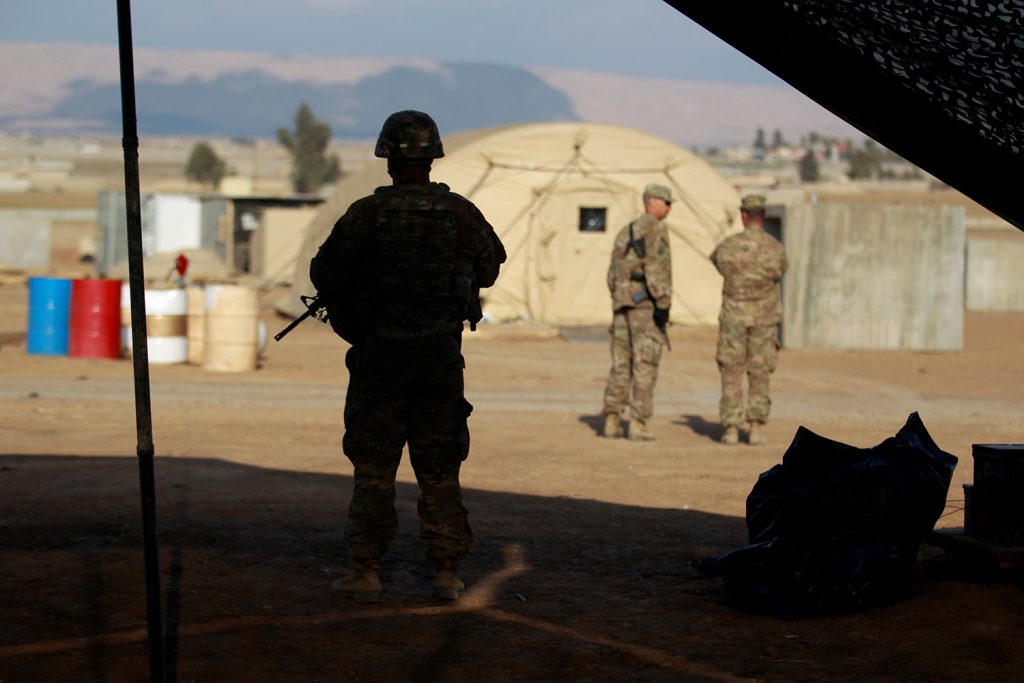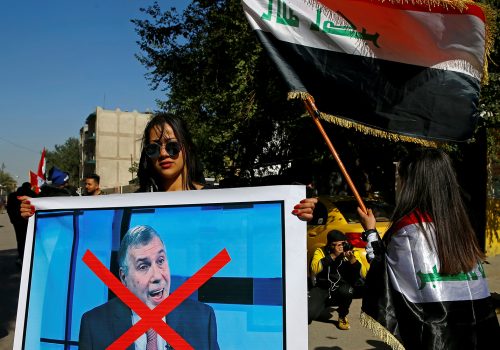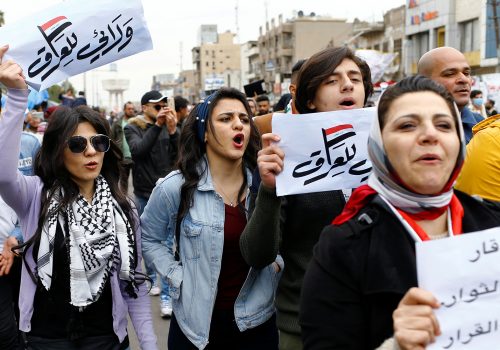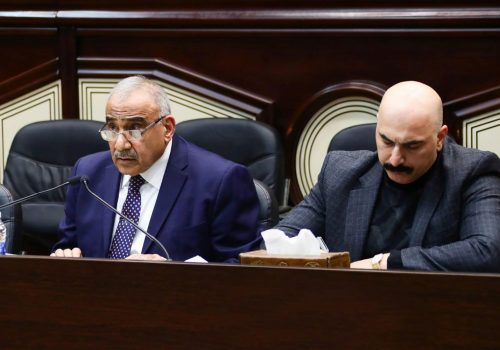Three Coalition soldiers were killed after fifteen small rockets hit a base housing coalition troops in Taji, Iraq on March 11, potentially the latest incident in the simmering conflict between the United States and Iran in Iraq. According to US officials, two of the killed soldiers were American, while the other was British. US and Iraqi government installations have been frequent targets of rocket attacks since December 2019, as pro-Iranian factions and elements of the Islamic Revolutionary Guard Corps (IRGC) have tried to build pressure on the United States to withdraw Coalition forces from Iraq.
The conflict blew open in January when a US strike killed Iranian General Qasem Soleimani and an Iraqi militia leader outside Baghdad. In retaliation, Iran fired more than a dozen missiles at an Iraqi military base housing US troops on January 8, wounding an estimated 110 US troops. In response to the back and forth between Tehran and Washington, the Iraqi parliament passed a measure on January 5 calling for the removal of all foreign troops from the country and canceling an agreement with the United States to station troops in the fight against the Islamic State of Iraq and al-Sham (ISIS).
Atlantic Council experts react to the March 11 missile strikes and analyze what it means for the US-Iran confrontation and the future of US-Iraqi relations:
Abbas Kadhim, director of the Iraq Initiative at the Atlantic Council:
“The attack on Camp Taji is another sign that Iraq is returning slowly to the pre-2011 insurgency. The Iraqi government is unfortunately incapable of controlling the various armed groups that have the ability to strike anywhere they want inside the country. The several thousand US troops scattered among many Iraqi military bases face serious challenges in providing force protection and performing their mission in Iraq: training Iraqi forces, combating ISIS, or providing protection to Coalition operations in Iraq.
“The escalating tensions between the United States and Iran in late 2019 and early 2020 drew Iraq into a conflict it always wanted to avoid. Iraq has become a theater for this conflict because it is struggling with internal chaos that led to the first government resignation in its post-2003 political era.
“The Iraqi government tried to ameliorate the situation by calling on the United States to negotiate a withdrawal of its troops from Iraq, but this call was rebuffed by the US State Department and US President Donald J. Trump went as far as threatening Iraq with “sanctions like they’ve never seen before, ever. It’ll make Iranian sanctions look somewhat tame.” Trump then hinted at the possibility of confiscating Iraqi money in US banks if Iraq insisted on a US troop withdrawal and refuses to compensate the United States for the money spent on military bases.
“The Trump administration’s hard bargaining position could potentially have success if it had one audience only: the Iraqi government, which cannot afford the loss of the United States’ partnership. Unfortunately, there is another audience that welcomes this hard-bargaining stance from the United States: Iran and the armed Iraqi groups that take its side. They would like to see the US troops withdraw at any cost to the Iraqi state. In fact, the worse the circumstances of any US withdrawal and its aftermath, the better it is for them, as their ideal endgame is not only a US troop withdrawal but a total breakdown of bilateral relations, including the US diplomatic presence in Iraq. All indicators show that the Trump administration is very close to handing these groups precisely this gift instead of halting the display of fighting words circulated in the media and undertaking behind-the-scenes diplomatic maneuvering.
“The United States can, and will, retaliate and kill many Iraqi fighters in the coming days. But this will not deter future insurgent actors. In fact, this escalation is exactly what the anti-US camp wants. They reject the notion that the United States is an ally that helps protect Iraq against external and domestic threats and will benefit from provoking the United States to seem like a threat to the Iraqi people. The casualties the anti-US camp will suffer will not bother them at all. What is on their mind is the lessons learned from past experiences in Iraq and elsewhere—most recently in Afghanistan—that if you fight the United States long enough, it will ultimately cut and run.
“What the United States needs to realize is that punishing the Iraqi people and their tenuous government will be another mistake in a long list of blunders and a sure way to lose this fight. Instead of proceeding with further escalation, the United States should pragmatically acknowledge the reality on the ground, which is that Iraq is facing an internal insurgency as well as popular protests demanding widespread reforms. Iraq needs the United States now more than ever to offer advice and support Iraq’s ability to enact reforms to address its many governance challenges such as the endemic corruption, the lack of service delivery, and the prevalence of foreign interference. That is the only way to address the underlying issues that have allowed Iran to exploit and influence groups inside Iraq in the first place. The United States cannot win in the long-term by undertaking an extensive (and unwanted) military posture in Iraq.”
Kirsten Fontenrose, director of the Scowcroft Center for Strategy and Security’s Middle East Security Initiative:
“The tit-for-tat pattern of escalation between Iran and the United States has restarted, thanks to Iran re-initiating violence. The US response to this loss of American and British life hit a position occupied by Iran-backed militias over a year ago along a critical highway linking Iranian assets in Syria and Iraq. It was a strategic target, meant to degrade Iran-backed militias’ freedom of movement, supply, and communications.
“What was the Hashd militia’s strategic intent in striking the base at Taji using the same tactic on March 11 as on December 29, namely rockets launched from the back of a truck aimed at a base housing Iraqi and international personnel? Their stated intent is to drive US forces out of Iraq. If this is the case, they are shooting themselves in the foot. US troops based in Iraq conduct two distinct missions. One is to fight the Islamic State. The other is to train and advise the Iraqi military on its conduct of operations against the Islamic State. Neither of these missions is linked to the maximum pressure campaign on Iran. Neither is linked to nuclear negotiations. Both make Iran safer.
“Were Iran to succeed through its Hashd proxies to cause the withdrawal of US forces, these militias would find themselves facing emboldened Islamic State fighters with no airpower, poor or no unified command and control, and a conventional partner force resentful that they’d been placed in greater danger.
“The more attacks Hashd group wage on bases that international troops share with Iraqi troops, the less likely it is that NATO will favor absorbing the US train and advise mission under the NATO banner. And if the United States leaves, NATO will leave. There is no replacement for NATO in this case. Russia cannot fill the gap, and China does not want to. Are Iraq’s armed forces ready to stand on their own against the Islamic State without the support of the US and Europe? Ask them.
“The government of Iraq will claim that Iraq is a victim, caught in the middle of this kinetic volley between Iran and the United States. Caught in the middle, yes. A victim, no. They are partially accountable. The militias are employees of the Office of the Iraqi Prime Minister, so the buck stops there. These militias operate with the tacit approval of Iraq’s senior decision makers. These decision makers must evaluate their tolerance for allowing people on their payroll to act as instigators of clashes that endanger Iraqi citizens.”
C. Anthony Pfaff, nonresident senior fellow with the Atlantic Council’s Iraq Initiative:
“The attacks that killed two Americans and one British citizen are an unfortunate escalation in the ongoing conflict between the United States and Iran. Sadly, one of the victims of this attack will be the US-Iraq relationship. It is unreasonable for the United States to partner with an Iraqi government that either will not or cannot stop attacks on US forces by Iran and its proxies.
“At the time of this writing there is little public information regarding the source of the attack; however, one would be hard pressed to believe Iran was not involved. While these attacks certainly appear to be a clumsy attempt at revenge for Soleimani’s death, without Soleimani it is difficult to tell if Iran’s actions have strategic purpose or if it and its proxies are just lashing out.
“Of course, the United States must respond. But this time it needs to respond smarter. The United States was certainly justified in responding to the late December attack that killed an American contractor with force; however, in doing so it undermined anti-Iranian protests and turned the people’s attention from opposing Iran to opposing the United States presence as well.
“Rather than falling into that same trap, the United States should use this moment to force Iraq’s hand. It is no longer tenable for Iraq to host US forces that are playing a critical role in its ongoing fight against ISIS and its successors and tolerate these constant—and lethal—attacks by Iran and it’s proxies.
“In forcing Iraq’s hand, the United States should make it clear that future military, economic, and political assistance is contingent on Iraq’s capability not only to put a stop to these attacks but also to bring those responsible to some kind of justice.
“Of course, the extent of malign Iranian influence makes it unlikely the Iraqi government can take such action on its own. But that is why now is the time to force Iraq to make its choice. Iran’s proxies are also part of Iraq’s security forces. If the Iraqi government cannot or will not prevent them from killing its own coalition partners, then it is hard to see how any US investment—whether political, military, or economic—is worthwhile.
“It’s obvious from the protests that Iraqis are sick of foreign influence of any kind. However, they depend on the kind of assistance that the United States provides to become a contributing member of the international community. That kind of assistance is not something that a weak, isolated Iran can provide.
“But it’s time to make it clear Iraq cannot have it both ways. If they want to become an Iranian vassal state home to the most virulent Sunni Islamist terrorist groups, there is nothing to the United States can do. However, with the ongoing lethal attacks on Coalition forces, the Iraqi government has to be made to understand that they will lose critical coalition support to avoid that outcome if they cannot put an end to Iran’s murderous efforts to drive those same partners out.”
Barbara Slavin, director of the Atlantic Council’s Future of Iran Initiative:
“While no one has taken responsibility for the latest US military deaths in Iraq, Iran-backed groups are plausible culprits. Thus, those who blithely asserted that the US assassination by drone of Iranian Maj. Gen. Qasem Soleimani and nine Iraqis on January 3 had “reasserted US deterrence” against Iran appear to have been sadly mistaken. Overwhelmed by the coronavirus pandemic, the Trump administration seems ill-prepared to deal with this crisis and its decision to escalate hostility toward Iran without a realistic diplomatic off-ramp even more irresponsible.”
Frederic C. Hof, distinguished fellow and former director of the Rafik Hariri Center and a former US special envoy to Syria:
“When the United States terminated the violent career of Major General Qasem Soleimani on January 3, Tehran’s nearly uninterrupted forty-year sense of escalatory dominance over Washington stopped with jarring suddenness. Starting with the 1979-1981 hostage crisis and the 1983 Iranian-orchestrated bombings of the American Embassy and Marine Corps headquarters in Beirut, the Islamic Republic had come to believe it and its acolytes could do as they wished to Americans without fear of appropriate retaliation. Indeed, Iran took it as gospel that American fear of escalation and a wider war would accord it something even better than peer status with a global superpower. The consequences of this deep-seated faith in American fear and passivity have been violence, instability, impunity, and actually increasing the prospects of a wider armed conflict by encouraging Iranian recklessness.
“The Soleimani killing, on the other hand, told the supreme leader and his confederates that the American enemy they held in such contempt might no longer be content with passivity or, at the most, limited retaliatory gestures punishing only privates and corporals; often teenagers serving in Iranian-officered militias. The killing of an active duty general officer close to the supreme leader told the corruptly violent Iranian political class that it too, for a change, might pay the ultimate price for murdering Americans.
“Tehran may now be probing to see if the Soleimani killing was a one-off event. There are reports of retaliatory airstrikes in Iraq conducted by aircraft of unspecified origin. Washington will find out soon if punishing privates and corporals will suffice to deter Tehran from killing Americans. The betting here is that it will not.”
Further reading:
Image: A US soldier from the 2nd Brigade, 82nd Airborne Division stands guard at a military base north of Mosul, Iraq, February 14, 2017. Picture taken February 14, 2017. REUTERS/Khalid al Mousily



